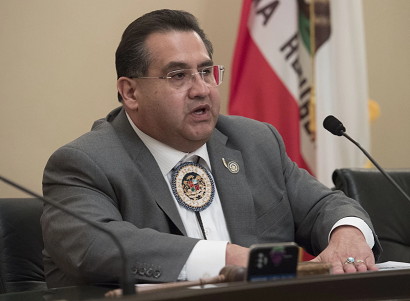
- Details
- By Levi Rickert
Opinion. Having a Native American in an elective office representing Indian Country issues is beneficial. Representation matters. Such is the case in California, a state with 109 federally recognized tribes. One elected Native, Assemblyman James C. Ramos, is making a difference.
With his election to the California State Assembly in 2018, the former chairman of the San Manuel Band of Mission Indians became the first Native American ever elected to the California state legislature. During his time in office, he has championed several pieces of important legislation that have become state law in the country’s most populated state.
Last October, five bills introduced by Ramos were signed into law by California Governor Gavin Newsom. The legislation included three laws on Indian education, a new law that removes derogatory names on state geographic places, and a law that created the Feather Alert system for missing Indigenous people.
His desire to improve the lives of Native Americans continues in 2023. Ramos is now bringing focus to mental health issues and the high rates of suicides in Indian Country.
On Friday, Ramos teamed with Didi Hirsch Mental Health Services to host the first-ever CA 988 Tribal Summit that brought attention to mental health issues in Indian Country and awareness of the federally mandated 988 crisis number at the Morongo Resort in Cabazon, California. As a fan of Ramos, I watched the summit remotely via Zoom.
The event’s purpose was to connect tribal communities and the providers who serve them to share perspectives on providing culturally grounded suicide prevention approaches, build collaboration among the other 988 crisis call center staff and Southern California tribal communities. Dozens of tribal behavioral health counselors and non-Native mental health providers were in attendance.
On hand were officials from the Substance Abuse and Mental Health Services Administration (SAMHSA) who broke down the difference between 911 or 988 for help. They said the public can dial 911 to dispatch first responders for fire or medical emergencies. The 988 helpline has been available since 2022 for those who need to talk to a behavior health counselor for a mental health crisis, such as a having suicidal thoughts.
Suicide is a major crisis in Indian Country. According to the Suicide Prevention Resource Center, Native Americans experience higher rates of suicide compared to all other racial and ethnic groups in the United States. Suicide is the 8th leading cause of death for American Indians and Alaska Natives across all ages. Native youth suicide rate is 2.5 times higher than the overall national average, making these rates the highest across all ethnic and racial groups.
"Suicide disproportionately affects American Indians and Alaskan Natives,” Morongo Band of Mission Indians Tribal Chairman Charles Martin said in his welcoming remarks to summit attendees. “We have the highest rate of suicide among both racial and ethnic groups in the United States. These rates have steadily increased over the last 20 years and may be linked to several issues."
In 2022, the Kaiser Family Foundation (KFF) reported that between 2010 and 2020, suicide death rates increased substantially among people of color, with American Indian or Alaska Natives experiencing a 41% increase. That translates to nearly 24 Native people out of 100,000. Tribal access to mental health services remains woefully inadequate.
In his introduction, Ramos spoke about the stigma associated with people seeking mental health treatment.
“It’s about time that we break that stigma, that stigma of somebody reaching out for support. Someone who wants to talk to somebody about what's going on in their life is no longer something that's taboo,” Ramos said. “It's time that we sit around the table and talk about these issues and get resources to those that drastically need it. Our ancestors are still crying out from the ground, ‘Tell them who we are as California people and let's get to the resources and get them out to our people so we can all succeed together.’”
Like most things he’s done over the years, Ramos is bringing a laser focus and sense of urgency to the issue of Native American mental health. With recent increases in federal funding for mental health — including mental health in Indian Country — Ramos is seizing the moment on this critically important issue.
It’s good that Native Americans have someone like James C. Ramos representing our needs and concerns. Native representation matters and can, quite literally, save lives.
And remember, if you or someone close to you is having suicidal thoughts, dial the 988 Suicide & Crisis Lifeline, which provides 24/7, free and confidential support.
Thayék gde nwéndëmen - We are all related.
More Stories Like This
The SAVE America Act Threatens Native Voting Rights — We Must Fight BackThe Presidential Election of 1789
Cherokee Nation: Telling the Full Story During Black History Month
Jesse Jackson Changed Politics for the Better
Native News Online at 15: Humble Beginnings, Unwavering Mission
Help us defend tribal sovereignty.
At Native News Online, our mission is rooted in telling the stories that strengthen sovereignty and uplift Indigenous voices — not just at year’s end, but every single day.
Because of your generosity last year, we were able to keep our reporters on the ground in tribal communities, at national gatherings and in the halls of Congress — covering the issues that matter most to Indian Country: sovereignty, culture, education, health and economic opportunity.
That support sustained us through a tough year in 2025. Now, as we look to the year ahead, we need your help right now to ensure warrior journalism remains strong — reporting that defends tribal sovereignty, amplifies Native truth, and holds power accountable.
 The stakes couldn't be higher. Your support keeps Native voices heard, Native stories told and Native sovereignty defended.
The stakes couldn't be higher. Your support keeps Native voices heard, Native stories told and Native sovereignty defended.
Stand with Warrior Journalism today.
Levi Rickert (Potawatomi), Editor & Publisher

